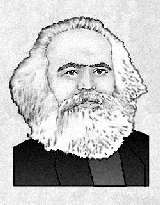
Born: May 5, 1818, in Trier, Germany
Died: March 14, 1883, in London, England
Karl Marx, along with Friedrich Engels, was one of the fathers of modern Communism. He was born into a Jewish family in Trier and he attended public school in his home town. Then, in perhaps the first revolutionary act of his life, his father, a lawyer, converted his entire family to Christianity. Marx was baptized in 1824.
Marx began studies in law, philosophy and history in 1835 at the University in Bonn. He was a distinguished scholar and went on to study at the University of Jena receiving a doctorate in philosophy in 1842. As a radical thinker, he was never accepted into academia, somewhat ironically since Marxist philosophy is now a predominant theme of many university courses in the Western world.
Having been rejected from a number of teaching posts he turned to journalism to disseminate ideas of socialist revolution. As a revolutionary in a dedicated fight against ruling social classes he was expelled from Germany, France and Belgium. His first in a long string of conflicts with authorities was in 1843 when he was forced to resign as an editor of a Cologne newspaper, Rheinische Zeitung. Shortly after his departure the paper was forced to stop printing.
While in Cologne Marx met and married Jenny von Westphalen who was a daughter of a government official who opposed Marx. Westphalen was a dedicated companion, and they had three children together.
In 1844, Marx moved to Paris where he met Engels. They talked, wrote and became partners in the formation of a new socialism based in the working class. They were both interested in developing communist principles and forming an international movement dedicated to those principles. Marx was soon banished from France on the request of Prussia. He then moved to Brussels.
While in Brussels he published his first major work, The Misery of Philosophy in 1847. Later that year he and Engels formed the Communist League. The members of the league asked for a statement of principles which became the Communist Manifesto. The doctrine was a collaborative effort between Engels and Marx. Engels did the editing and gave Marx the credit for most of the ideas behind the Manifesto.
The Manifesto has been called the ultimate expression of Communism. It envisions a classless society in which personal property which will be abolished. After the publication, and subsequent translation, revolutions occurred in France and Germany. The two fathers of Communism fled Belgium and returned to Prussia.
Marx was arrested in Germany for inciting an armed insurrection. At his trial he was acquitted, but was expelled, and forced to live his life in exile in London. It was a difficult time for Marx who constantly struggled with poverty. Engels, who was a successful business man had to supply Marx with money and would later in life give him a pension of £300 a year. Marx's fortunes improved slightly when he was hired as a correspondent for the New York Tribune.
In England, he began sketches on Das Kapital, published in 1867. Engels would later edit and publish further editions. Marx became the unofficial leader of the International Working Men's Association during 1864-1876. His wife died in 1881, and he never recovered emotionally from the shock.
Although his physical presence stirred up fear and prejudice his influence was greater after his death and his work continues to shape political thought. Marx is remembered for his contributions to the growth of the labor movement, the analysis of class struggle, and the articulation of theories on the capitalist economy. His philosophy, called Marxism or scientific socialism, was revived by Lenin, and applied by the Bolsheviks.